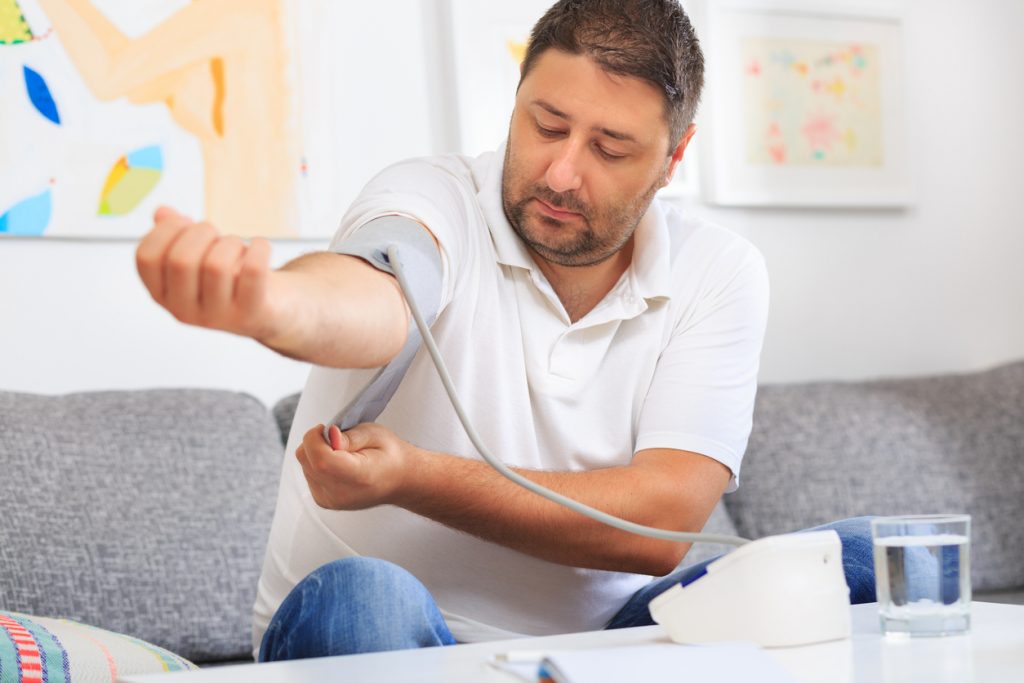How to manage high blood pressure, Dr Andrew explains
If we think of our vascular system using the analogy of a river system, then arteries are the rivers, the blood being pumped by the heart is the water, and the force the water is running at – and the pressure it puts on those artery walls – is our blood pressure.
The reason it’s so important to understand this force, is that it tells us a lot of information about how hard the heart is working, and what else might be contributing to an abnormal blood pressure reading.

What are blood pressure levels?
High blood pressure, also known as hypertension, is diagnosed when the pressure exerted on our artery walls is too high.
“A normal blood pressure reading is 120/80 mmHg,” explains Dr Andrew Thompson.
“Whilst some people will naturally have a lower reading than this without any consequences, higher readings are associated with a significantly increased risk of cardiovascular disease. As we age our arteries stiffen and this leads to higher blood pressure readings, however, it is important that this is recognised early and treatment is initiated to bring the readings back into normal ranges.”
How is blood pressure measured?
Blood pressure is measured using a tool called a sphygmomanometer. A sphygmomanometer (or blood pressure monitor) uses an inflatable cuff that wraps around a patient’s upper arm and is inflated to increase pressure. These can be either entirely electronic, or operated by a doctor who will manually pump air into the cuff and then listen through a stethoscope to take the readings.
The readings will give your doctor two numbers, which is why you see blood pressure represented as one number over another – for example, 120/80.
“When we measure a patient’s blood pressure we primarily look at two numbers,” says Dr Thompson. “Firstly – though this is an oversimplification – the higher number is the pressure in your arteries after your heart beats, this is called your systolic blood pressure. Secondly, the lower number is the pressure in your arteries after your heart relaxes, this is termed your diastolic blood pressure.”
In Australia, a person is generally considered to have high blood pressure if they consistently return readings of over 140/90 – meaning if either their systolic blood pressure is higher than 140mmHg or their diastolic blood pressure is higher than 90mmHg – or both.
A doctor will usually want to take several readings to confirm high blood pressure, as it is possible to have an occasional high reading that doesn’t indicate an ongoing elevation.
The Heart Foundation of Australia uses the following guidelines:
| Normal | 120/80mmHg |
| Normal to high | 120/80mmHg – 140/90mmHg |
| High | 140/90mmHg or higher |
| Very high | 180/110mmHg or higher |
In Australia, over one third of people over the age of 18 have high blood pressure.

High blood pressure symptoms
One of the reasons it’s so important to have your blood pressure checked regularly is that high blood pressure or hypertension typically has no symptoms at all.
“It is very common to not have any symptoms with high blood pressure,” says Dr Thompson.
“Symptoms, if they occur, can include headaches, blurred vision and chest pains however this usually indicates very poorly controlled blood pressure that has progressed significantly.”
What does high blood pressure feel like?
The risks associated with high blood pressure occur because it can affect blood flow to your organs – which means uncontrolled high blood pressure can increase your risk over time of developing heart disease, stroke, kidney disease, eye problems and erectile dysfunction.
Low blood pressure, on the other hand, is rarely a cause for concern. However if you feel dizzy, lightheaded or unusually cold, be sure to inform your doctor as dramatic drops in blood pressure or chronic low blood pressure that causes symptoms should be monitored.
How to manage high blood pressure
There are significant lifestyle modifications people can make that can greatly improve blood pressure.
Diet and exercise
Sodium – found in salt – is linked with high blood pressure, so one of the first ports of call for people wishing to reduce their blood pressure through diet is to limit salt intake. Lowering the amount of sodium you consume to less than 4 grams per day (equivalent to 1600 milligrams per day of sodium) can positively impact your blood pressure. More broadly, maintaining a balanced, nutrient-rich diet has been shown to keep blood pressure in check.
Regular exercise (2.5-5 hours per week of moderate-intense exercise, or 1.25-2.5 hours of vigorous activity per week for 18-64-year-olds) is linked with a host of health benefits that can see your blood pressure remain in the normal ranges. But even more exciting, even small increases in physical activity have been shown to lower blood pressure, with the greatest benefits observed in people who had hypertension to begin with.
Smoking, alcohol and coffee
Quitting smoking creates immediate benefits in the body – including a reduction in blood pressure. If you need support ditching cigarettes, there are resources available to help, including Quit.
Likewise, reducing alcohol consumption or ditching the booze altogether. Women who consume more than one standard drink per day and men who consume more than two standard drinks per day are at an increased risk of high blood pressure.
In terms of coffee – specifically the caffeine in coffee – the jury is out on just how it affects long-term blood pressure. While caffeine can cause temporary spikes in blood pressure, some studies have shown regular caffeine consumers have higher blood pressure than people who don’t consume it, while others reveal caffeine tolerance in regular coffee drinkers reduces the impacts. If you do suffer from high blood pressure, it’s important to talk to your doctor about how caffeine may be affecting your condition.
Medication
If you are experiencing symptoms, you should speak to a doctor to find out the right treatment for you. You can request a telehealth consultation with one of our Australian-registered doctors from anywhere in Australia, seven days a week.
To speak with an InstantScripts Doctor:
Request a ConsultationIf you have run out of your script:
Request a ScriptBek Day is a writer and journalist with over 15 years of experience in the health and lifestyle space.
© InstantScripts
Level 8 / 637 Flinders St.,
Docklands VIC 3008

